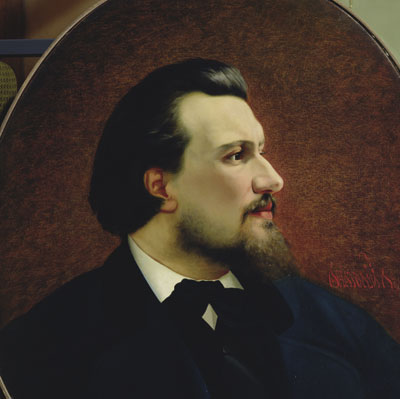Though underestimated in the English-speaking world, Nikolai Leskov is one of the greatest of 19th-century Russian writers. Donald Rayfield has described him as
‘Russia’s best-kept secret’.
Richard Pevear’s excellent introduction to this selection includes Anton Chekhov’s account of how Leskov — ‘his favourite writer’ — said to him at the beginning of his career, after a night of carousing, ‘I shall anoint you with oil as Samuel did David. Write.’ This little scene, which could be from one of Leskov’s own stories, perhaps offers a clue as to why he is not more widely recognised. We don’t know whether to laugh at the story or to feel moved by it; similarly, we don’t know how seriously to take Leskov as a whole — and we English have always expected our Russian writers to be unambiguously serious. We want to be shown a character’s spiritual development; we want to be given truths to live by. But what Leskov gives us is something else: story matters more than character, and all we get by way of metaphysical insight is a sense that life’s horrors and beauties are so intermingled as to be beyond all understanding.
Leskov’s ancestry was unusually hybrid. His mother was born to an impoverished gentleman who married a merchant’s daughter. His father came from a line of village priests but ended up farming a small estate. Leskov spent much of his childhood among peasant children. As a young man, he worked for three years in estate management, for a firm called Scott & Wilkins — Scott being the surname of his English uncle by marriage, and he travelled widely throughout European Russia. All this gave him a broad knowledge of Russian society; he wrote later that, since he had grown up among the common people, it was not for him ‘either to place the peasants on a pedestal or to trample them beneath his feet’.
The scope of Leskov’s work is vast. This volume — the first substantial English selection for many years — includes ‘Lady Macbeth of Mtsensk’, perhaps the most powerful of all literary evocations of lust-inspired murder, a dozen of his shorter stories and two of his best longer stories, ‘The Sealed Angel’ and ‘The Enchanted Wanderer’. ‘The Sealed Angel’ is one of the few adequate portrayals in Russian literature of the life of the Old Believers, the schismatics who rejected the 17th-century liturgical reforms and who, by the early 20th century, made up a fifth of the country’s population. ‘The Enchanted Wanderer’ is the supreme example of Leskov’s ability to tell a story whose flow is both unstoppable and unpredictable; it cannot be summarised in a brief review.
Another difficulty that Leskov presents is his language, which moves between the colloquial, the folk-poetic and the pseudo-educated. These shifts of register are hard to reproduce. In some respects, he is an archaic writer, less a novelist than a storyteller; in other respects he is a modernist, a poet whose focus is on the behaviour of words themselves.
Pevear and Volokhonsky set themselves the admirable goal of reproducing Russian classics in all their strangeness, not smoothing anything over, not toning anything down. But here, as in their previous translations, they do not fulfil the claims Pevear makes in his always impressive introductions. Their English is often odd, but it is seldom interestingly or expressively odd. Their dialogue is particularly weak. This is how, in their version of a key chapter of ‘Lady Macbeth of Mtsensk’, Katerina accuses her lover, Sergey, of promiscuity: ‘And why were you fool enough to deal with unworthy ones. With unworthy ones there shouldn’t be any love.’ Sergey replies:
Go on, talk! Is that sort of thing done by reasoning? It’s all temptation. You break the commandment with her quite simply, without any of these intentions, and then she’s there hanging on your neck. That’s love for you!
In the original, all this is powerful and straightforward. Here, however, there is no sense of living speech.
One of Leskov’s finest stories is ‘Lefty’, about a left-handed Russian metalsmith who tries to prove the superiority of Russian craftsmanship by shoeing a lifesize dancing steel flea that the English have given to the Russian tsar (Russian nationalist admirers of Leskov often ignore the fact that the extra weight of the shoes makes the flea unable to dance!). In this story Leskov’s word-play is more virtuoso than ever. Pevear and Volokhonsky try to reproduce it, but their puns are lame. When an Englishman tries to persuade Lefty to change his religion, their Lefty refuses, ‘Because our Russian faith is the most correct one, and as our anceptors believed, so the descenders should believe.’ This lacks any real point or wit.
It is a pity that most publishers are so eager to proclaim the newness of a translation. Instead of attempting ‘Lefty’ themselves, Pevear and Volokhonsky could have included the outstanding version of this story by the late William Edgerton. Here is his translation of this sentence: ‘Because our Russian faith is the rightest one, and the way our forefathers believed is just the way their dissentants have to believe.’ The combination of ‘rightest’ (so much more eloquent than ‘most correct’!) and ‘dissentants’ draws attention to how Russian insistence on the absolute rightness of Orthodoxy led to a fifth of the population being anathematised by the Russian church and so alienated from the Russian state. Leskov — who wrote to his German translator, ‘If you translate “Lefty”, you’re the foremost magician’ — would have been delighted at this recreation of his work.
Edgerton remains at this level of excellence throughout; every pun and malapropism — as in the original — is imbued with meaningful social commentary. His translation is a masterpiece that every lover of Leskov should do all they can to draw attention to. The present volume, however, is inferior not only to Edgerton but also to the now out-of-print translations by David Magarshack and David McDuff.






Comments